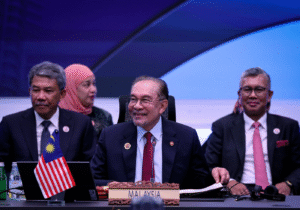Excerpt from Secretary-General’s Press Conference at the ASEAN-UN Summit in Kuala Lumpur

Press events | António Guterres, Secretary-General
Ladies and gentlemen of the media,
Selamat petang. [Good afternoon.]
It is an honour to visit Malaysia and to participate in the 15th ASEAN–UN Summit.
I thank the Government and people of Malaysia for their generous welcome.
Ladies and gentlemen,
But I am appalled by the deplorable situation in Myanmar.
The military takeover in 2021 has piled calamity upon calamity.
Villages bombed or burned.
Thousands killed.
Millions displaced.
Regional stability at risk.
A military attacking the civilians it’s meant to protect.
And now the spectre of elections within an active conflict.
The atrocities and the cycle of impunity must end.
I reiterate my call for an immediate end to the violence;
A genuine commitment to inclusive dialogue;
And a credible path back to civilian rule – starting with the swift release of all those arbitrarily detained.
The United Nations fully supports the ASEAN Five-Point Consensus.
I welcome strengthened cooperation between my Special Envoy, Julie Bishop, with her ASEAN counterpart.
And I applaud ASEAN’s commitment to providing humanitarian assistance to the people of Myanmar.
The way forward must lead to a restoration of democracy – institutions anchored in the rule of law and human rights;
Guarantee safety, justice, and opportunity for all;
And address the root causes of persecution, disenfranchisement, and conflict.
Crucially, it must include the Rohingya people.
They have waited too long for peace. Too long for democracy. Too long for the world’s solidarity.
Last month’s high-level conference in New York brought renewed expressions of support for Rohingya and host communities and renewed interest in finding solutions.
I call on all sides to set aside political agendas, prioritize the rights of the people of Myanmar, uphold international law, protect civilians, and allow unhindered humanitarian access.
It’s time to open humanitarian channels, end the violence, and facilitate a comprehensive political solution.
The people of Myanmar are counting on our collective support.
Let’s deliver it.
Ladies and gentlemen of the media,
Across these challenges, ASEAN can light the way forward.
The United Nations is proud to be ASEAN’s partner as we work to ensure a better, more peaceful future for people across the region and around the world.
And I thank you.
***
Question: Good afternoon. This is Joseph Sipalan from the South China Morning Post. Just following up on the point you raised on Myanmar. As you mentioned, they’re planning to hold an election in December, which will likely exclude more than half the country and tens of millions of voters who are in conflict areas. What is the UN’s position on it, and what would you suggest ASEAN do? Would you suggest that they do what they can to stop the elections until Myanmar meets the five-point consensus. Thank you.
Secretary-General: I don’t think anybody believes that those elections will be free and fair. I don’t think anybody believes those elections will contribute to the solution of the problems of Myanmar. I think this is the moment in which we need to increase humanitarian assistance, to stop the violence, and at the same time time to pave the way for a political evolution leading to civilian rule and to respect for a constitutional form of government.
Question: My name is [inaudible] and I’m from [inaudible]. Referring to your earlier remarks on the situation in Myanmar and the call for free and fair elections. So may I ask, how long will the United Nations continue to only urge or call for action? And when will concrete measures be taken to ensure accountability and real progress? Thank you, sir. […] We only heard about: we urge, we urge, we urge. So, who will be responsible for the action? Is it ASEAN or how can you influence ASEAN to take action […]?
Secretary-General: Well, the Human Rights Council has just decided the creation of a mechanism of investigation in relation to Myanmar. And I believe that this can become an important instrument of accountability.





